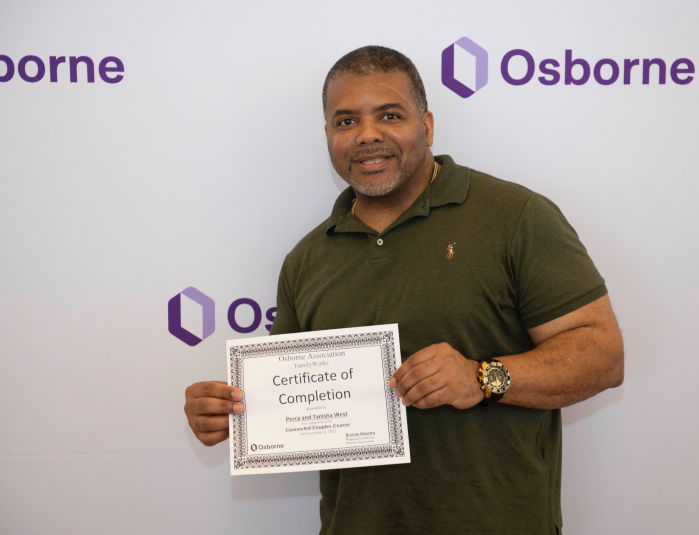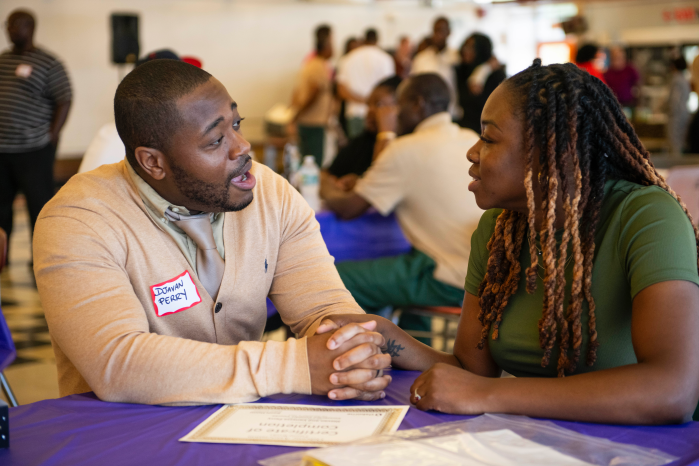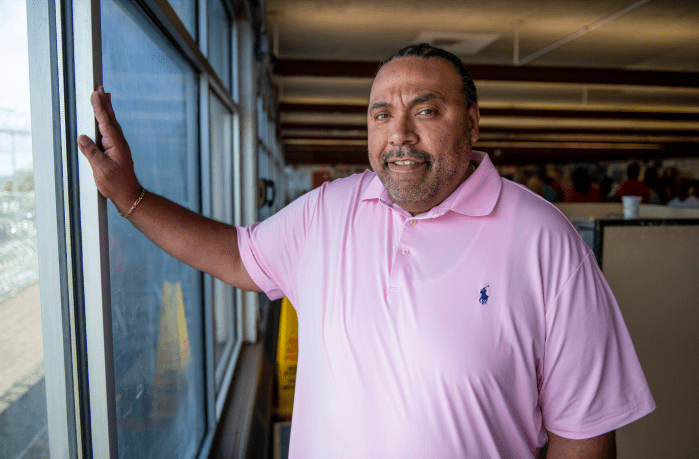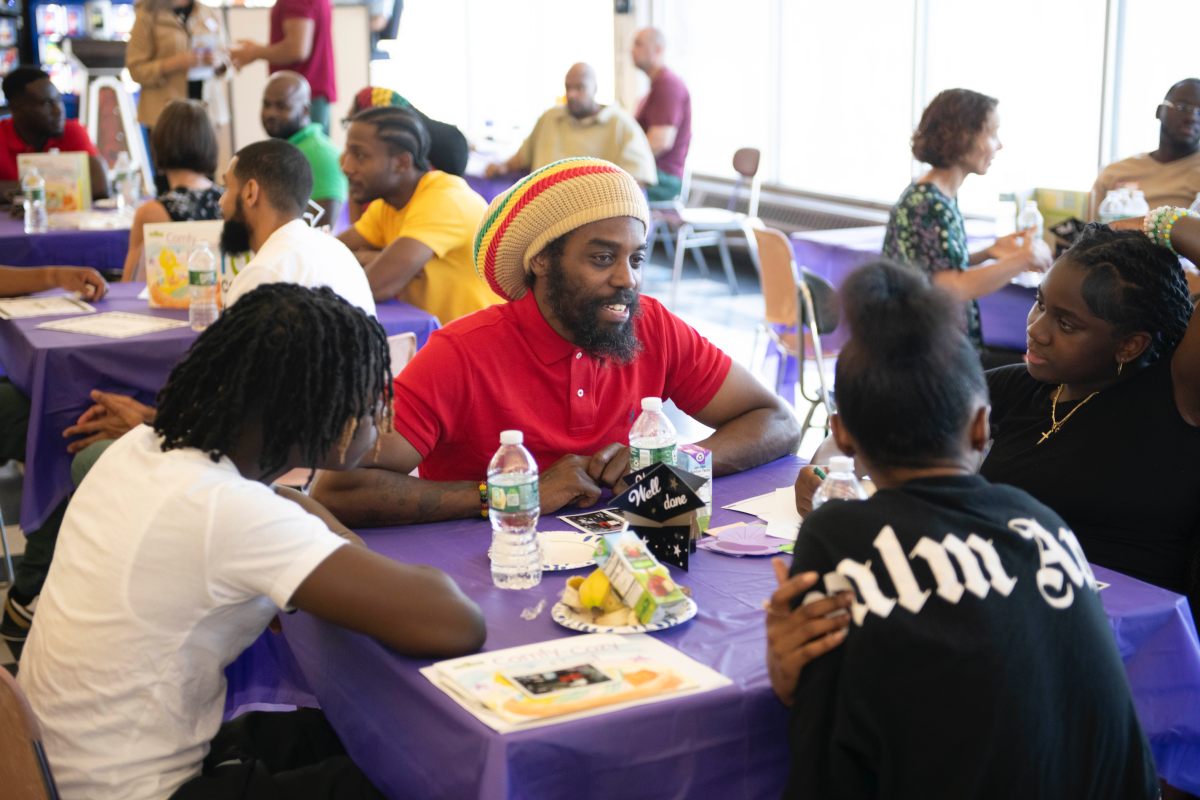A graduation ceremony on June 26 along the scenic Hudson River in Westchester County saw 35 men of all ages come together to celebrate their accomplishments as their families gathered around — with smiles on their faces and applause filling a cold-walled room.
Within a building made of 40-foot concrete walls that blocked out any sunlight, and guards perched in watchtowers at every 100 feet, the graduates — many of them from New York City — received their certificates of accomplishment.
That accomplishment? Learning how to be part of a family while serving hard time.
The happy group of men graduated from a family connections and life-skills program called FamilyWorks at Sing Sing Correctional Facility, the infamous maximum security prison in Ossining that houses some of the state’s most dangerous offenders.
The men wound up there after being convicted for truly heinous acts of violence, including murder, armed robbery, and attempting to kill police officers. But on this Wednesday in June, each incarcerated man recognized the importance of connection, communication and what it takes to be a close family member even while behind bars.
FamilyWorks is run by the Osborne Association, a nonprofit that supports incarcerated individuals and their loved ones. The program helps men at eight New York state prisons be effective parents and partners while they serve their time.
The men learn how to communicate with their wives or girlfriends and be active listeners, all skills that will prove useful for them in prison — and if they ever get out.
“The program allowed me to look at myself and see what I was doing wrong. It helped me communicate with my wife,” admitted Percy West, a 51-year-old inmate at Sing Sing from Brownsville, Brooklyn. “We used to have a dialogue that turned into a monologue, and then it turned into nobody listening. I’m not listening to her, she’s not listening to me.”
West and his wife, Tanisha, have had many difficulties with their relationship, often getting into arguments during visitation, which are available at Sing Sing seven days a week.
During the “Connected Couples” session of the four-month FamilyWorks program, West learned a variety of listening and de-escalation techniques. His wife was allowed in for the program to practice the listening exercises together, though she was not there for his graduation.
“One exercise is, she has to sit there for a certain amount of time without talking, and it was killing her,” West explained playfully. “I’m talking about her to the facilitator, and she can’t say nothing.”

Afterward, it would be West’s turn to get an earful from his wife, keeping mum until the facilitator, from FamilyWorks, tied the exercise together.
“But then we both had a chance to talk. We asked, ‘What can we do to make this better?’ So it helped with our communication,” he said. “And it helped the relationship.”
West does not know if he will ever leave prison to utilize his newfound skills in society. He is serving 130 years to life for a botched robbery he committed in Canarsie, Brooklyn, in 1992. As part of the robbery, he shot at NYPD officers who responded to the scene. He called the sentence “unfair.”
Once involved in prison gang violence, with a five-inch scar on his face to prove it, West says he looks forward to visits from his stepchildren, nieces and nephews.
“I don’t have any biological children, but I’m a stepfather,” West said. “I want to be the best stepfather in the world. I’m always there for them like they’re mine. I don’t try to replace their father but I give them advice, I have fun with them.”
When permitted during visitation, the family spends time in the children’s center, a small room tucked in the corner of a building at Sing Sing that is packed with toys, story books with Sesame Street characters, games like Candyland and Uno, and fluffy carpeting to sit on.
“I’m a big kid when I go in there. When my nieces and nephews come, we go in there. I’m on the floor playing, it’s hard to tell who’s the kid,” West joked.

Half of all Americans have a relative in jail
A Cornell University study from 2019 showed that 45% of Americans have had a family member jailed or imprisoned, a fact that researchers say not only affects people in jail and their families, but all of society.
Peter Enns, a lead author on the study, said in a Cornell Chronicle article that incarceration has a profound effect on the family.
The Osborne Association recognized this information and more years ago when it started FamilyWorks at Sing Sing in 1986. The staff, almost all of them licensed social workers and some of them inmates who work as “clerks” handling administrative duties, teaches roughly 200 men a year how to be effective fathers and partners within the barrier of the prison system.
As part of the parenting sessions within the curriculum, facilitators talk to participants about child development, how children typically behave at different ages, and the important role of being a father.
“It touches on a lot of things, and it’s evolved over time,” said Brenda Maietta, FamilyWorks program coordinator. “Of course, it teaches the gentlemen about the developmental stages of children, the impact of incarceration on families, and recently we started talking about the impact incarceration has on child brain development.”
Maietta said it is traumatic when a child is separated from his or her parent for an extended period, especially under circumstances involving law and criminal justice.
In fact, several university studies have shown that parental incarceration may be worse than the death of a mother or father. Having a parent in prison or jail has been linked to attention deficit disorders, behavioral problems, even learning disabilities and language problems.
“Think about what it would be like if you come home and your dad is there everyday and then he’s not,” Maietta said. “Or worse yet, you’re there and see your dad getting arrested. Think about how scary that is for a kid. We all have that fight or flight feeling. When kids are subjected to that over and over again it’s something that affects brain development. If they are in a constant state of fight or flight, it’s really going to impact them.”
Some spouses, and even inmates, worry about bringing their kids into Sing Sing for visits and FamilyWorks sessions. The concern is that they’re going to think it’s nice and they’re going to want to go to prison.
“But that’s just not true,” Maietta said.

One inmate’s 5-month-old daughter was born while he was — and still is — in Sing Sing.
The correctional facility offers the Family Reunion Program (FRP), which gives approved incarcerated men and their families the opportunity to meet for an extended period of time in a home-like setting. FRP sessions are held every 45 days in small, private, house-like dwellings around the perimeter of the prison where families can cook, rekindle and otherwise spend time together.
Djavan Perry, 33, is from Brownsville, Brooklyn and has been at Sing Sing for five years, incarcerated for 13. He and his wife, Vanessa, agreed that it is “very hard” to have a relationship while Djavan is locked up.
He joined FamilyWorks to strengthen his relationship with Vanessa and be more “productive” with his time in prison.
“What was big for us is active listening. “I have to listen to what she is telling me and not be so reactive. These are life skills, it’s not just about the relationship. Being able to recognize what someone is going through is important.”

Djavan is serving 22 years to life for shooting an 18-year-old man to death in Brownsville. He is now 13 years into his sentence and will be eligible for parole in nine years.
As for how he met Vanessa: it was when he first arrived at Sing Sing. Though the Perrys knew each other years ago, they reconnected through a prison communication website called J Pay.
“One day I was sitting in my cell, and I get a message that said, ‘Hi stranger,’” Djavan said. “I knew she was the one. She’s the one who got away, but now she’s not going anywhere.”
Making a difference after Sing Sing
Wilfredo Laracuente, 48, of the Bronx’s Melrose neighborhood, completed his 20-year incarceration sentence at Sing Sing in 2021. For 10 years, he was a clerk for FamilyWorks, putting him in charge of various duties for the program, including curriculum writing, administrative support and recruitment.
On June 26, he returned to Sing Sing as the keynote speaker for the graduation.
“I advocate for things that we need,” Laracuente told the graduates. “All of you will return home. All of you have a duty when you get home not only to yourselves but to everybody on the other side of the room because they have been your support system since day one. When things got rough and they had to sacrifice for you, that’s a conversation that you have with them. They deserve a round of applause, not just for today but for being there for you.”
Laracuente credits FamilyWorks with inspiring him to further his education and strengthening his relationships with his family, including his daughter. Today, he works for Columbia University facilitating creative writing workshops for people incarcerated at Rikers Island in NYC. He is also an activist who wears many hats within the Osborne Association to support its advocacy work.

Can programs like FamilyWorks help incarcerated men stay away from crime when they are released?
FamilyWorks does not track recidivism rates following release, so it is difficult to say how well the program helps incarcerated men stay out of prison once they are out.
But there is research that shows family connections are a factor in improved health and emotional well-being of people who are incarcerated and have benefits for correctional systems and public safety in terms of reduction in prison rule violations and reduced recidivism.
Marlyn Kopp is Sing Sing’s superintendent, a title known to most people as “prison warden.” She echoed what the research has shown and said there is “absolutely” a difference in the men before and after they go through FamilyWorks.
“You can see it in the speeches that the speakers made today,” Kopp said. “You see the progress when someone is getting involved in these programs. They are very different men.”
Kopp added that going through a program like FamilyWorks give them an introspective look at what could have led them to the penitentiary.
“I absolutely believe that participating in programs like this help them understand what may have happened that led them to incarceration and the changes that are needed to remain out when they are released.”
FamilyWorks is offered at several other NYS state correctional facilities. At Sing Sing, the program is so popular, there is a waitlist of over 120 men.
Read More: https://www.amny.com/news/






































